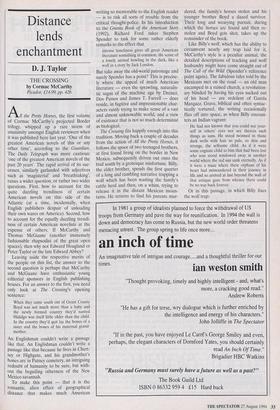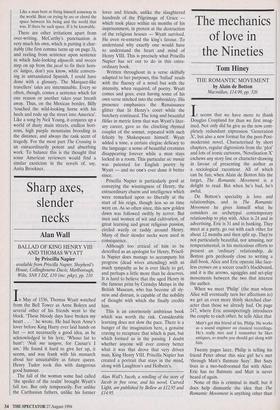Distance lends enchantment
D. J. Taylor
THE CROSSING by Cormac McCarthy
Picador, £14.99, pp. 426
All the Pretty Horses, the first volume of Cormac McCarthy's projected Border trilogy, whipped up a rare storm of unanimity amongst English reviewers when it was published here last year. 'One of the greatest American novels of this or any other time', according to the Guardian. The Daily Telegraph was more cautious: `one of the greatest American novels of the past 20 years'. The rapid arrival of its suc- cessor, similarly garlanded with adjectives such as 'magisterial' and 'breathtaking', raises a wider question, or rather two wider questions. First, how to account for the quite dazzling trendiness of certain American novels on this side of the Atlantic (at a time, incidentally, when English publishers despair of unloading their own wares on America). Second, how to account for the equally dazzling trendi- ness of certain American novelists at the expense of others. If McCarthy and Thomas McGuane (another immensely fashionable rhapsodist of the great open spaces), then why not Edward Hoagland or Peter Taylor or the late Edward Abbey?
Leaving aside the respective merits of the people on this list, the answer to the second question is perhaps that McCarthy and McGuane have enthusiastic young editorial sponsors in English publishing houses. For an answer to the first, you need only look at The Crossing's opening sentence:
When they came south out of Grant County Boyd was not much more than a baby and the newly formed country they'd named Hidalgo was itself little older than the child. In the country they'd quit lay the bones of a sister and the bones of his maternal grand- mother.
An Englishman couldn't write a passage like that. An Englishman couldn't write a passage like that because he lives in Chert- sey or Highgate, and his grandmother's bones are in Putney cemetery, an intriguing redoubt of humanity to be sure, but with- out the beguiling otherness of the New Mexico savannah.
To make this point — that it is the romantic, alien effect of geographical distance that makes much American writing so memorable to the English reader — is to risk all sorts of trouble from the critical thought-police. In his introduction to the Granta Book of the American Story (1992), Richard Ford takes Stephen Spender to task for some rather elderly remarks to the effect that
intense loneliness gives all great American literature something in common, the sense of a lonely animal howling in the dark, like a wolf in a story by Jack London.
But take away the old-world patronage and surely Spender has a point? This is precise- ly where the appeal of much American literature — even the sprawling, naturalis- tic sagas of the machine age by Dreiser, Dos Passos and James T. Farrell — does reside, in fugitive and impressionable char- acters vainly trying to make sense of a vast and almost unknowable world, and a view of existence that is not so much determinist as biological.
The Crossing fits happily enough into this tradition. Moving back a couple of decades from the action of All the Pretty Horses, it follows the spoor of two teenaged brothers, at first found living on the border in New Mexico, subsequently driven out onto the trail south by a grotesque misfortune. Billy, the elder brother, spends the first quarter of a long and rambling narrative trapping a wolf which has been wasting the family's cattle herd and then, on a whim, trying to release it in the distant Mexican moun- tains. He returns to find his parents mur-
dered, the family's horses stolen and his younger brother Boyd a dazed survivor. Their long and wearying pursuit, during which the horses are found and then re- stolen and Boyd gets shot, takes up the remainder of the book.
Like Billy's wolf, which has the ability to circumvent nearly any trap laid for it, McCarthy's style is a peculiar animal, the detailed descriptions of tracking and wolf husbandry might have come straight out of The Call of the Wild (Spender's reference point again). The fabulous tales told by the Mexicans met on the road — an old man encamped in a ruined church, a revolution- ary blinded by having his eyes sucked out of his .head — are redolent of Garcia Marquez. Grave, biblical and often syntac- tically tortured, the writing occasionally flies off into space, as when Billy encoun- ters an Indian vagrant:
He had not known that you could see your- self in others' eyes nor see therein such things as suns. He stood twinned in those dark wells with hair so pale, so thin and strange, the selfsame child. As if it were some cognate child to him that had been lost who now stood windowed away in another world where the red sun sank eternally. As if it were a maze where these orphans of his heart had miswandered in their journey in life and so arrived at last beyond the wall of that antique gaze from whence there could be no way back forever.
Or in this passage, in which Billy fixes the wolf trap: Like a man bent at fixing himself someway in the world. Bent on trying by arc or chord the space between his being and the world that was. If there be such space. If it be knowable.
There are other irritations apart from over-writing. McCarthy's punctuation is very much his own, which is putting it char- itably (the first comma turns up on page 3), and reeling from sentence upon sentence in which hale-looking alguacils and mozos step on up from the jacal to fix their hors- es' latigos, don't you know, while convers- ing in untranslated Spanish, I could have done with a glossary. The Marquez-like travellers' tales are interminable. Every so often, though, comes a sentence which for one reason or another takes your breath away. Thus, on the Mexican border, Billy `touched the wild-looking horse with his heels and rode up the street into America'. Like a song by Neil Young, it conjures up a world of dusty main streets, endless hori- zons, high purple mountains brooding in the distance, and always the rank scent of tragedy. For the most part The Crossing is an extraordinarily potent and absorbing work. To balance this is the thought that some American reviewers would find a similar exoticism in the novels of, say, Anita Brookner.



























































 Previous page
Previous page